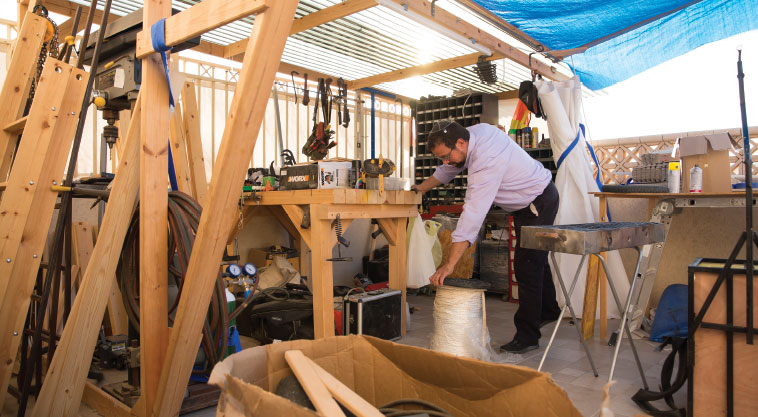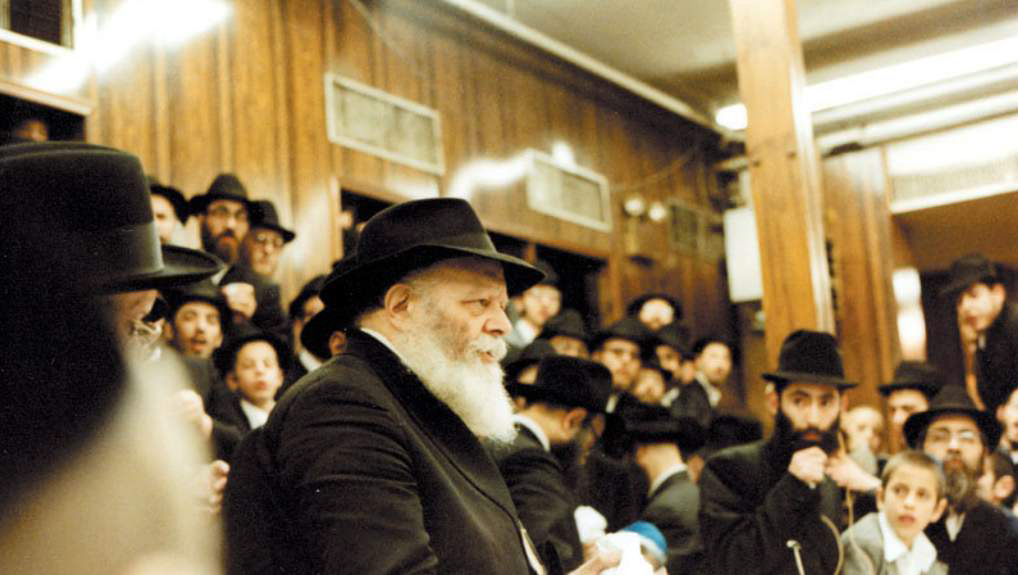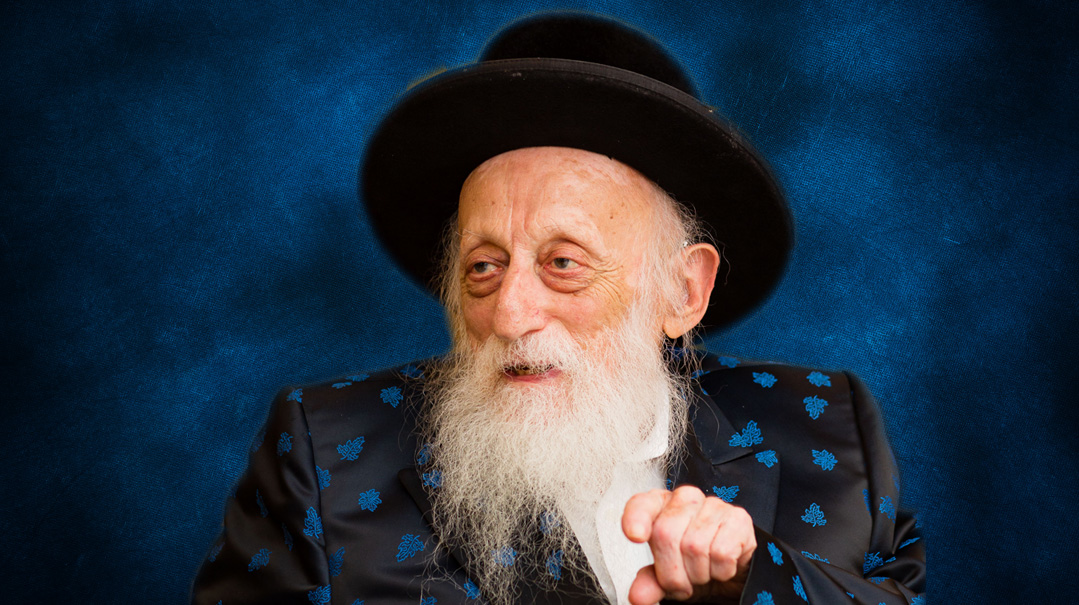Winging It to the Holy Land


(Photos: Amir Levy, Family archives)
When Jon Hollinger was raising chickens that would be brought to the table of the Skverer Rebbe, you could have confused his Mennonite Christian family with the chassidim. With their long skirts and bonnets, and long-sleeved button-up shirts, the Hollingers looked like they’d stepped right out of the shtetl. The external similarities went even deeper, with a lifestyle that includes separation of the genders from a young age as well as shunning popular culture.
Maybe that’s why an encounter at a rebbishe wedding in New Square actually served to draw Jon — today Akiva — closer on his journey toward Yiddishkeit. Akiva describes the circumstances that led him to this most unlikely venue:
“Rabbi Naftuli Lauber, the secretary of the Skverer Rebbe, would regularly come to the hatchery where I worked to order chickens for the Rebbe, and after a while we became friends. Seeing my interest, he invited me one day to the wedding of the Rebbe’s grandson. He told me to come alone because, he said, ‘It’s gonna be really big!’ He wasn’t exaggerating — I figure there were about 4,000 men and boys there.
“Rabbi Lauber had things to do, and I guess he didn’t want me to feel like a fish out of water, so he seated me next to one of his friends, a rabbi who was there with his son and father,” Akiva recalls. “They explained to me everything that was going on. As we were talking, I was fascinated by how his son — I’m guessing he was in his twenties — was explaining to me about his life in New Square. ‘I love it here.’ he said. ‘On Shabbos, the children can run and play in the streets. You don’t have to worry about cars….’ You could see the passion in his eyes. It wasn’t something he was doing because it’s just the way he was brought up. And you could see that passion running through all three generations, that understanding of what and why they did what they did.”
That meeting resonated deeply with Akiva, who is likewise passionate about passing down the love for Hashem and His Torah to his progeny in a way that will stand the test of time.
Bound for Holiness
From their semi-detached house in a religious district of the Negev town of Ofakim, Akiva and Batya Hollinger share what made them decide to join Am Yisrael, and just a year and a half later, to settle in Eretz Yisrael. Batya sits with their baby, 12-month-old Adina, on her lap, while their firstborn, 16-year-old Chaya, stays on hand to help with her younger siblings, and to fetch boxes of old family photos. David and Avraham, aged 14 and 13, are in yeshivah, but I get to meet 11-year-old Rivka and nine-year-old Rachel. Tzefania, Hadassah, and La’el, aged seven, five, and two, run gleefully from the patio out the front door and back again, having a grand time while their parents are occupied.
The living room is spacious, if sparsely furnished. A charming handmade quilt spread over a bench in the corner bespeaks the life and community the family has left behind. Both born in Pennsylvania, Akiva and Batya, then Jonathan and Charlene, grew up within a community of Mennonites, a Christian sect with many similarities to the Amish. I remark on the quilt, prompting Batya to send Chaya to bring another one down from upstairs, this one with an intricate Bargello design. Both were sewn by Akiva’s mother, who, true to Mennonite tradition, works only from the home, while the children still live at home.
Akiva still maintains regular contact with his parents, and speaks to his father once a week. “If you don’t teach your children to respect your father, whom they can see, how will you teach them to honor their Father in Heaven, Whom they can’t see?” Akiva says. Beyond that, he clarifies, “It’s important to me that there is no negativity in the relationship, because that gets passed down to the children.”
The Hollingers’ quest for more meaning began some 15 years ago. “After our marriage, we agreed that we didn’t want to celebrate Xmas and Easter, since we knew those holidays had pagan roots,” Batya relates. “In time, we stopped eating pork and shellfish; we figured if G-d forbade them in the Bible, there must be a reason. We also started observing Saturday as the Sabbath because we understood that this was the day that Hashem set aside for rest.”
One factor that accommodated their spiritual development was their relatively remote environment; they lived on a small farm in Quakertown, Pennsylvania, outside of an established Mennonite community. As they became increasingly drawn toward Judaism, the Hollingers sought a Jewish community, but quickly understood that the Conservative and Reform congregations available in their locality weren’t what they were looking for.
Discovering ArtScroll opened up a new world for them, and they delved into the ArtScroll Chumash and commentaries, as well as books on chagim, the siddur, and halachah. To this day, ArtScroll is a valuable resource that they continue to use for self-study, which includes a lot of Tanach.
“I love learning daf yomi, don’t get me wrong,” Akiva says, “but I see study of Chumash as the basis of everything. I think that if people would take the time to do more in-depth Tanach study, it would change their perspective on life.”
Step by Step
When asked if he or Batya had an “aha moment” when they realized they wanted to join Am Yisrael, Akiva is quiet.
“People often ask me that, and I don’t have a good answer,” he reflects. “It was such a gradual process with incremental steps, I can’t say there was one decisive moment.”
Akiva’s first up-close encounter with a frum Jew was with the secretary of the Skverer Rebbe, Rabbi Naftuli Lauber. To support his growing family, Akiva worked at a hatchery, managing the hatching of chicks and breeder flocks and overseeing vaccinations of the eggs and fowl. As some of the chicks were earmarked for Orthodox communities in the vicinity, rabbis used to come to supervise various aspects of the process. The Skever Rebbe had a very particular set of requirements for chickens, and Rabbi Lauber approached Jonathan to discuss arranging a steady supply.
What began as a business contact developed into a close friendship. Rabbi Lauber showed Jonathan around New Square, and also visited the Hollingers on the farm. Wanting to help them in their pursuit of knowledge of Torah and mitzvos, Rabbi Lauber referred the Hollinger family to Rabbi David Wilensky of the Congregation Sons of Israel in Allentown, Pennsylvania, who would become the most instrumental component in the next stage of their odyssey. Rabbi and Rebbetzin Wilensky adopted the Hollingers, teaching, answering questions, providing explanations, and filling in as surrogate family. Jonathan started to study regularly with the rabbi, who gave him his first taste of Gemara study, while Charlene learned practical halachos and hashkafah from the rebbetzin.
“One year, Rabbi Wilensky invited us for the High Holidays,” Batya relates. “Not only would this be an opportunity for us to experience Yamim Noraim services, but Rabbi Wilensky wanted us to enjoy the inspiring melodies of well-known cantor Reb Yaakov Lemmer. At that point, we weren’t driving on Shabbat anymore, and Rabbi Wilensky assured us that he’d work something out. When we arrived, he simply gave us the keys to a house within walking distance of the shul. I remember thinking, ‘Well, this is different!’ I mean, we didn’t even know these people! We’d never experienced such selfless hospitality before.”
“They were an inspiration to our whole community in every single way,” Rabbi Wilensky tells Mishpacha. “They were unique in that they weren’t interested in the trappings of modernity. Everyone just loved schmoozing with them.”
Rabbi Wilensky first met the Hollingers when they came for Purim. “They said they just wanted to see what it was like. After that, they started coming for Shabbos.”
Rabbi Wilensky recalls how the Hollinger boys would shovel the driveways of the elderly residents in the winter and mow their lawns in the summer, for the sake of pure chesed.
When it was clear that the Hollingers were serious about following through with geirus, Rabbi Wilensky advised them to leave the farm and move to Allentown. In January 2016, they found a house inside the eiruv, about two-and-a-half blocks from the shul, and registered the children at the local Jewish day school. They lived about half a block from the Wilenskys, whom they would see almost every Shabbos. A little over a year later, in February 2017, the family converted under the auspices of Rabbi Dov Brisman, of the Philadelphia beis din. To this day, Rabbi Brisman is the address for any sh’eilos they have, and Akiva contacts him once a year to let him know how they are doing.
After the move to Allentown, Akiva started liquidating the farm, where he’d kept various animals. His children well remember the day he brought their yak and a few lambs to New Square to have them shechted, as part of a demonstration Rabbi Lauber had organized for the cheder children.
“I took my boys along, and it was a great experience for them,” Akiva says. “Rabbi Lauber said there’d be about 30 spectators, but more and more people kept coming. New Square has its own security team, and they were perfectly capable of handling the crowd, which eventually grew to about 400.”
Sixteen-year-old Chaya, a nature buff from her years on the farm, smiles at the recollection. I wonder what it could have been like for a teenager who had to leave the farm where she’d grown up and hear about the animals being shechted. “There were animals I got attached to, and animals that I didn’t get attached to. I learned to tell the difference,” she says.
Away from the farm and with all the children enrolled in Jewish schools, Akiva was suddenly saddled with a huge financial burden. Rabbi Wilensky helped them obtain financial assistance, and Akiva started a new job. “The job was based in Miami and involved constant traveling as well as other complications, so I ended up quitting. But opportunities always came along. Hashem took care of us.”
Home Sweet School
It’s one thing to make such a major life decision as to embrace Judaism and convert; it’s quite another to do so as a family with (at the time) eight children. For the Hollinger children, the biggest change was moving to day school — due not so much to the change in curriculum as to the change in setting. Until then, they’d been homeschooled. Mennonites homeschool when there is no suitable religious school in their vicinity, and Akiva and Batya naturally pursued this educational route when their children grew to school age.
Akiva and Batya emphasize that they weren’t looking to isolate the children from the negative as much as to have an active, positive influence and to be able to exert greater control over what their children were learning.
“If you focus on the negative, saying, ‘I’m trying to avoid x, y and z,’ they’re eventually going to see those things,” Akiva explains. “As I see it, you have to say, what am I doing this for? I want to have a say in what’s being taught in a positive way.”
Homeschooling turned out to be a boon in more ways than one, enabling the Hollingers to introduce Jewish concepts to the children as a natural outgrowth of their education. This, in a nutshell, was how the children were brought on board with their parents’ spiritual aspirations.
“We told them what we were doing as we went along,” Batya says. “Each step was small — there were no drastic changes.”
As any mother knows, just doing homework with kids who are away at school all day is hard enough; how does one mother manage to homeschool a whole family of kids, with girls and boys of different ages? Batya gives me a basic rundown of a typical school day on the farm: “You get up in the morning, eat breakfast, do chores, and then have school until lunch. The little ones go down for their nap, and the older ones do the next lesson in the book. If they have questions, they ask and I explain. Then we go out and work in the garden, do baking, or other tasks.”
There are special textbooks available for homeschooling, together with a teacher’s manual that explains how to present the subject matter, while giving ideas for activities. Teaching the younger children basic skills, such as reading, is more time-intensive; the older children are more independent. In Pennsylvania, families who homeschool are required to report to their local public school every year with a portfolio showing what they’ve taught, and the children are tested to ensure they’re on par with their peers.
Batya makes homeschooling six children (the number of their school-aged children before their move to Allentown) sound like a breeze. “If there was a baby on the way, I’d make accommodations, such as start school in August. Then we’d take off about a week when the baby was born. It was fine as long as we got in our 180 days in the year.”
But school isn’t just about learning; what about the social aspect? Akiva explains that the children had plenty of friends from the neighborhood who were also homeschooled and with whom they’d interact on a regular basis. “There are groups set up for field trips geared particularly to homeschoolers. And once a year there was a two- or three-day homeschool convention at the local school.”
After a year of day school, Chaya last year attended the all-girls Kosloff Torah Academy in Philadelphia, about an hour’s commute from Allentown. “Day school was a harder adjustment for her,” Batya admits. “But she really loved high school. After that, she told us she’d never want to go back to a mixed setting.”
The two older boys only started yeshivah once they arrived in Ofakim, but they, too, prefer it to the mixed day school back in the US. Apparently, the culture shock of mixed education was even greater than that of moving to a new country.
The Promised Land
The Hollingers have taken the challenge of geirus to a whole new level with their move to Eretz Yisrael. Akiva relates that their friends and acquaintances were shocked when they heard they were making aliyah.
“Most people talk about it, but they never actually do it,” he notes.
The idea was born during a visit to Israel in 2014. Akiva joined a mission organized by the rabbis in the Allentown shul to visit wounded soldiers during Operation Protective Edge. That brief trip was enough for Akiva to fall in love with Eretz Hakodesh.
“If I hadn’t had my family to return to, I would have just stayed,” he says. “Soon after I got back, we starting planning aliyah.”
Now, after five months of living in Ofakim and going to ulpan in Be’er Sheva, they’ve gained some perspective. “People warned us about all the negative things before we left — the settling-in process, the Israeli bureaucracy, etc.,” says Akiva. “In all honesty, we don’t think about that. Nefesh B’Nefesh did a tremendous job, and as for bureaucracy, well, it’s no different from anywhere else. I think the negativity stems from expectations. This is the Promised Land! Don’t expect everything to be handed to you on a silver platter.”
Akiva had some general ideas about how he would make a living once he moved to Israel. Now he’s working on starting a business building sturdy children’s beds that are geared for maximizing small living quarters. Akiva’s unique design gives each child his own space, with room to embed some closet space and drawers. Additionally, the beds are wired so that each child can have his own fan and night light, thereby reducing potential for clashes.
Finding Their Place
Watching the Hollingers in action, you see laughter, lighthearted banter, and children who appear composed, confident, and happy.
“I expected the road to be a lot bumpier, but it actually went exceptionally well, baruch Hashem,” Akiva notes. “The children adjusted in their schools, particularly with the language barrier. Of course, there have their hard days… but on the whole they’re enjoying it.”
Akiva credits his father with imparting him with lessons on how to combat peer pressure. “I teach the kids that it’s okay to be different. We don’t have to be like the world to be part of the world. We have to be able to say, ‘I’m okay with being different.’ But before anything else, the child has to be in an environment where he feels comfortable.”
The Hollingers did some research in order to find just such an environment.
“In the first two weeks after our arrival in July, the middle of summer vacation, we had a steady stream of people coming to us,” Akiva says. “A friend from Allentown, who today lives in Bnei Brak, tried to help get us into a few schools, and I appreciate his efforts. They did a phenomenal job reaching out and making us feel welcome. But most of those school representatives expended a lot of energy telling us why not to send our children to other places, not why we should send to them. I’m not saying they’re bad, but as I see it, you don’t degrade somebody else to build yourself up. They were saying, ‘We’re better,’ rather than, ‘Here’s what we have to offer.’
“Bnei Akiva was the only school that said absolutely nothing about anybody else. They basically said, ‘This is what we have to offer. This is what we can do. Come talk to the principals.’ They really did their homework ahead of time, and had an idea what they could do for us, ulpan-wise, education-wise, helping with Hebrew, with the dynamics in the classroom. It’s not that I think the others couldn’t have done it. It’s about how to keep your children all on board as you go along. If you live in a negative mindset, it’s going to get passed right on to the children. When you calculate those costs, you have to make a reckoning, ‘Is it worth this if you’re going to lose all that?’ ”
For Akiva, the other main point is transportation. Recalling Chaya’s daily commute to Philadelphia last year, Akiva says that he believes that extended traveling time takes a heavy toll on growing children, and is determined to avoid it at all costs.
“I asked the different school reps where the children go after they’re nine, ten, eleven years old. They told me that they go to Be’er Sheva or Yerushalayim. Either they travel back and forth or they dorm. Well, to my mind, 13 years old is not the age you want them to stay overnight; it’s not the age you want them navigating life on their own.”
“So how do you like school in Israel?” I ask nine-year-old Rachel.
She answers me in fluent Hebrew, her accent hardly noticeable, that she likes it very much. And if she doesn’t understand the Hebrew?
“The teacher translates for me,” she says simply.
Welcome to Israel
Ofakim is not the conventional destination for American new olim, but the Hollingers have long stopped following the crowd.
“We wanted a place that had a warm climate, and we didn’t want a big city,” Batya says.
The Hollingers were actually planning on settling in Be’er Sheva, but Hashgachah pratis led them to Ofakim. For any newcomer, and for geirim in particular, community plays a seminal role.
“I’d say we’re more attached to the Chabad community, although we don’t necessarily fit into that box,” Akiva says. “If you’re trying to label it, we probably do fit there structure-wise, belief-wise. In terms of chinuch, too — I see that in the Chabad community, instead of building a wall, they’ll put a rope, draw a line, and give detailed explanations as to why and why not. I think that’s important for children, because if they’re not taught why to believe what they believe, it’s not going to last.”
I ask if they feel accepted, and Batya affirms that the neighbors have been very nice and welcoming.
The same can’t be said for the neighbors less than 30 kilometers away, in Gaza. In the second week of November, the Hollingers were “initiated” into Israeli life when communities in the south were pounded by a rocket salvo from Hamas.
“We had one siren here in Ofakim,” Akiva relates. “Our house is closest to the playground, and when the siren sounded, people ran in from outside and crowded into our safe room. I thought, There’s no room for me in there anymore, so the boys and I just stayed outside and watched the fireworks show of the Iron Dome intercepting the rockets.”
Batya interjects: “He’s very relaxed and the rest of us are taking it in stride.”
“Hashem didn’t bring us this far to die that way,” Akiva adds. “We try to be balanced, we’re not going to be foolish, but we’re not going to run scared, either.
“It reminded me of what Rabbi Brisman told us before we converted. He said it was something he told every potential convert. ‘You are becoming part of a People who are hated, that the nations want to kill.’ I think people forget that. Hamas is waging war against us, against Hashem. What do we expect differently?
“But when you think of the millions of dollars Hamas spends — what, they can’t aim? Look, it’s not that far. I hunted when I grew up. It’s like, you aim… I think Hashem is trying to get a point across, that He is going to fight our battles. There’s still a fight, but Hashem says, ‘I’m going to do it for you.’ So, I think, it’s about finding the balance between when to take cover and when not to. When I saw that our safe room was full, I understood that we were as safe outside as on the steps in here.”
(Originally featured in Mishpacha, Issue 741)
Oops! We could not locate your form.












